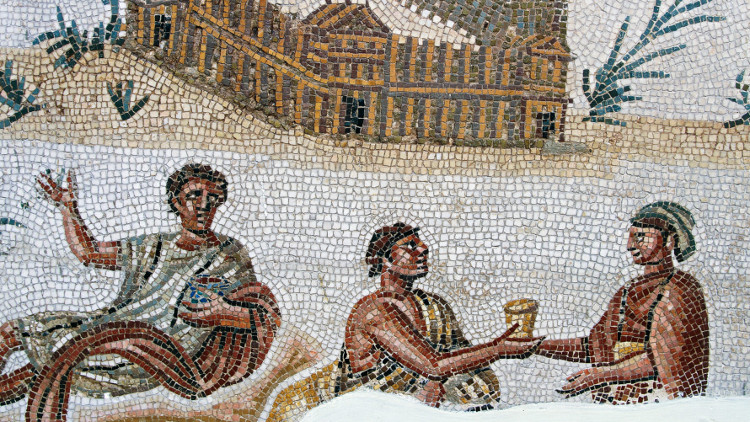How to help Romans have beautiful white teeth without toothpaste
The ancient Romans probably didn't need to go to the dentist, because they all had an extremely healthy set of teeth. Nearly 2,000 years ago, toothpaste and brushes did not exist, but their secret lies in and less sugar.
This discovery was confirmed by the optical X-ray writer Giovanni Babino after he swept the bodies of 30 buried men, women and children under the state dating from 79 AD.
'People in Pompeii eat lots of fruits and vegetables but very little sugar. They eat healthier than we are today and have really good oral health, 'said Elisa Vanacore, a dental specialist. 'Teeth research can reveal more about their lives'.

The low-sugar diet helped the ancient Romans own an extremely healthy set of teeth.
In 79 AD, a volcanic eruption in Rome engulfed part of Pompeii with more than 2,000 inhabitants of this ancient city. The earthquake caused a part of the city to be ruined, causing the deaths of more than 2,000 people.
The ash from the volcano buried the corpses, then hardened into a pumice. Over time, the organs of the victims were rotten, leaving holes with their skeletons. Archaeologists had to pump plaster into the pumice to shape the remains of the victim's body.
Nearly 2,000 years, 30 embryos preserved in rubble and dense ash have revealed vivid details of volcanic eruptions. Accordingly, many victims suffered brain injuries when the city collapsed because of the earthquake. They were buried under the rubble of houses, pubs, public baths .
A 4-year-old boy's body was found in a large house like a mansion, along with the bodies of his parents. A woman is hugging a baby on her lap and dying in a sitting position. Most victims were deformed before dying.
Putting these bodies through CAT scans, scientists also discovered an amazing detail. The teeth of these Romans are extremely healthy. There are bones that exist with teeth over time showing up on the scanner in a very beautiful way.


A CAT scan image shows that the teeth of ancient Romans were extremely healthy.
Experts say that is the result of a healthy diet in Rome, in which people eat a lot of fruits and vegetables and limit sugar.
'This study is a big step forward for our understanding of the Roman world , ' said Massimo Osanna, director of the Napoli archaeological area. 'Their diet is balanced and healthy, similar to our Mediterranean diet today'.
Another surprising finding is that the water supplied to Pompeii can be very rich in fluoride. It is also a reason for the strong teeth of this city resident.
This research project brings together a large team of experts in Italy, including radiologists, archaeologists, anthropologists and dentists.

A framework of the body of the volcanic eruption at Pompeii is inserted into the scanner.
In fact, the Romans are not the only community in the past to have healthier teeth than we do today. Evidence also suggests that the English before the 17th century also had strong teeth. Again, the reason is because their diet has less sugar.
However, things have changed after the reign of Queen Elizabeth I, whose teeth have been recorded in history. This coincided with the 1600s, when sugar production skyrocketed in Europe and sugar prices plummeted.
Road has the opportunity to creep into the European diet and destroy their teeth. This is so popular that the films set in the 17th century in England were later criticized for being untrue, if the actors in them were shaped with too beautiful teeth.
- Video: 5 other functions of toothpaste you may not know yet
- The secret of strong teeth of ancient Romans
- 9 ways to make teeth white
- Activated charcoal toothpaste whitening is a scam
- The reason why you brush your teeth
- Ways to clean teeth without brush and toothpaste: how beneficial?
- Tablet toothpaste helps protect the environment
- Fluorine toothpaste: Beneficial and harmful
- Super toothbrush do not need to use the cream is still clean
- Your teeth have this strange white spot? This is the reason they appear
- The toothpaste tube will be replaced by the peel dissolved in the mouth
- The factors that determine the whiteness of teeth
 Discovered an ancient centipede fossil 99 million years old
Discovered an ancient centipede fossil 99 million years old Discovered bat-like dinosaurs in China
Discovered bat-like dinosaurs in China Discovered a 200-year-old bronze cannon of the coast
Discovered a 200-year-old bronze cannon of the coast Discover 305 million-year-old spider fossils
Discover 305 million-year-old spider fossils Spain discovers teeth of 3 people who are not of our species
Spain discovers teeth of 3 people who are not of our species  Why many people grind their teeth while sleeping
Why many people grind their teeth while sleeping  How to choose the best toothpaste for your teeth
How to choose the best toothpaste for your teeth  The history of orthodontics, braces and interesting secrets that few people know
The history of orthodontics, braces and interesting secrets that few people know  The army of transforming robots helps clean teeth
The army of transforming robots helps clean teeth  Successful research on biomaterials stronger than spider silk
Successful research on biomaterials stronger than spider silk 